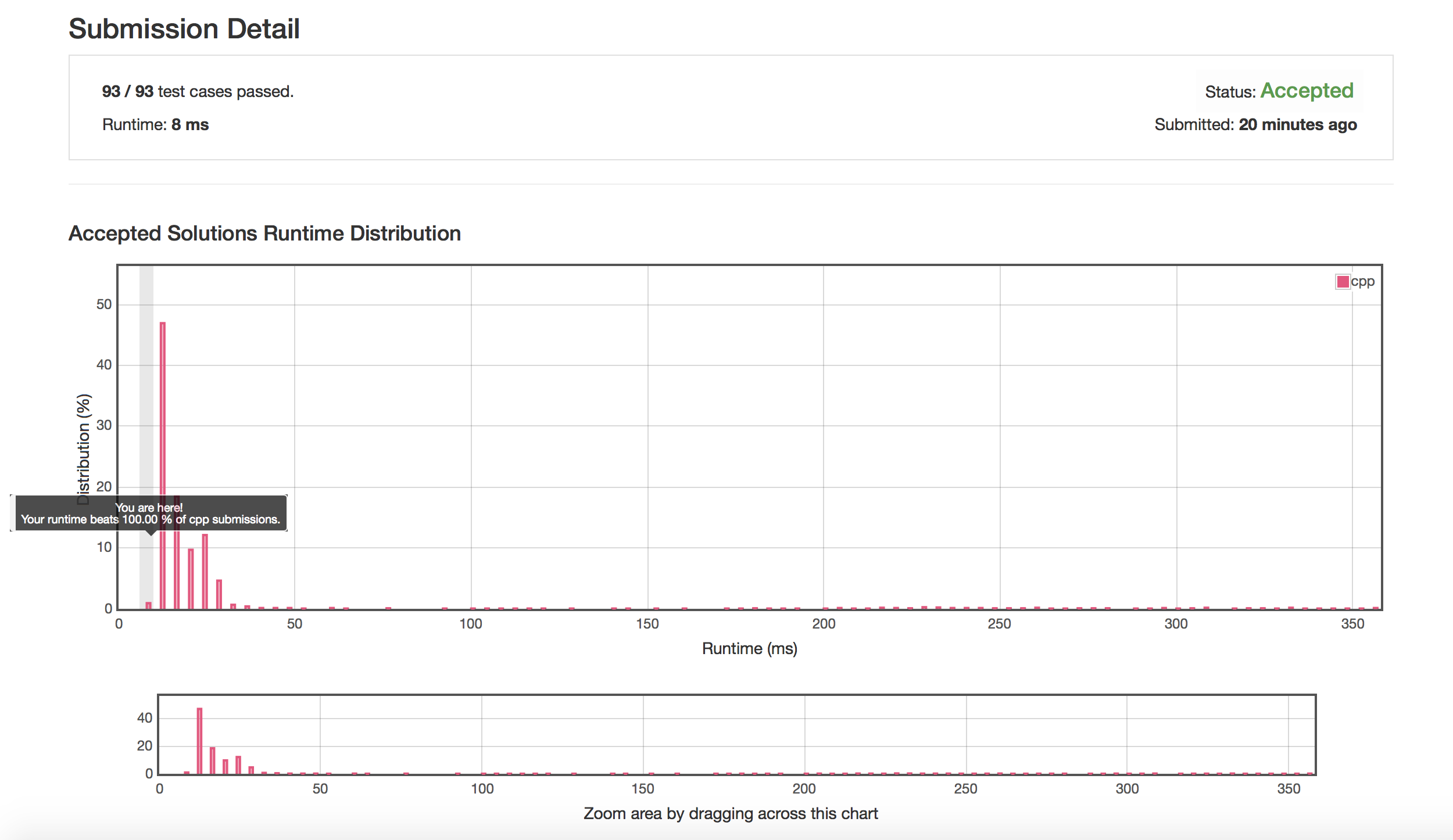题目 124. Binary Tree Maximum Path Sum
Difficulty: HardTotal Accepted: 145.3KTotal Submissions: 519.8K
Given a non-empty binary tree, find the maximum path sum.
For this problem, a path is defined as any sequence of nodes from some starting node to any node in the tree along the parent-child connections. The path must contain at least one node and does not need to go through the root.
解题报告 AC 截图 题目大意 给定一个非空的二叉树,我们需要找到一个路径,使得路径上所有节点的值的和最大。需要注意的是,该路径最少需要包含一个节点,同时这个路径可以不沿着树边「由父到子」的方向走,但是不可以回头。同时,这个路径也不需要经过根结点。
解题思路 很简单的 DFS + 贪心算法就可以求解。因为路径可以不经过根节点,因而任何子过程都有可能产生一个最优解。为了记录这些最优解,我们建立一个全局变量来记录当前的最优解。考虑一条路径,以最上层的节点的视角,其有三种可能的形状:向左/右子树延伸,同时向两个子树延伸,以及一个裸节点。
其中,第一种情况和第三种情况的路径可以被上层节点复用,来构成新的路径;而第二种情况的路径则不能拓展,因为路径不能回头,因而不可能有分叉。因而,在每个子过程中,我们获取左右子树的非第二种情况的最大 sum 的路径,将其中大于 0 的都与节点的值相加,并尝试更新全局最大值。然后选择其中最大的大于零的 sum,与节点的值相加,并返回该值,作为「非第二种情况的最大值」。
然后,不要忘记加上 iostream 的加速装置~我们的最优解就出炉啦:
题解(最优解) C++ 代码 1 2 3 4 5 6 7 8 9 10 11 12 13 14 15 16 17 18 19 20 21 22 23 24 25 26 27 28 29 30 31 32 33 34 35 36 37 38 39 40 41 42 43 44 45 46 47 48 49 50 51 52 53 54 55 56 57 58 59 60 61 62 63 64 65 66 67 68 69 70 71 72 73 74 75 76 77 78 79 80 81 82 83 84 85 static const auto runfirst = []() { std ::ios::sync_with_stdio(false ); std ::cin .tie(nullptr ); return nullptr ; }(); class Solution {public : int globalMax = 0 ; int maxPathSum (TreeNode* root) globalMax = root->val; int maxSum = root->val, temp; temp = subtreeMax(root->left); if (temp > 0 ) maxSum += temp; cout << temp; temp = subtreeMax(root->right); if (temp > 0 ) maxSum += temp; cout << temp << endl ; if (maxSum > globalMax) globalMax = maxSum; return globalMax; } int subtreeMax (TreeNode* subroot) if (subroot == nullptr ) return 0 ; int val = subroot->val, temp1, temp2; temp1 = subtreeMax(subroot->left); temp2 = subtreeMax(subroot->right); if (temp1 > 0 ) { if (temp2 > 0 ) { if (temp1 > temp2) { val += temp1; if (val + temp2 > globalMax) globalMax = val + temp2; return val; } else { val += temp2; if (val + temp1 > globalMax) globalMax = val + temp1; return val; } } else { val += temp1; if (val > globalMax) globalMax = val; return val; } } else if (temp2 > 0 ) { val += temp2; if (val > globalMax) globalMax = val; return val; } if (val > globalMax) globalMax = val; return val; } };





